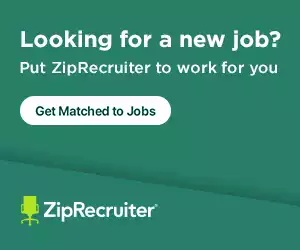- Interview Preparation
- Your Resume Needs Lots of Work
- You Don't Know How to Interview
- You Don't Know How to Dress
- You Don't Have the Right Experience
- You Did Not Read the Job Description
- You Can't Answer My Questions
- You Didn't Ask Any Questions
- You Don't Know Anything About my Company
- You Have a Poor Attitude
- Summary
We may receive compensation when you click on links to products from our partners.
In today’s competitive job market, making a strong impression during the hiring process is more crucial than ever. But sometimes, despite seemingly good interviews and qualifications, you might find yourself not getting that coveted job offer. While there are many factors at play, some consistent patterns can cause hiring managers to say ‘no.’ In this article, we’ll delve into the key reasons why you might not be making the cut—some of which you may not even be aware of.
Whether it’s unexplained gaps in your resume, lack of enthusiasm, or even something as subtle as body language, knowing these pitfalls can help you avoid them in your next
Interview Preparation
Hiring managers face a challenging task. They must sift through a plethora of resumes, identify the most promising candidates, make a final selection, and then hope their decision proves to be the right one. According to statistics, even the best hiring managers succeed in this complex process only 60% of the time.
Naturally, you’ll need to not only secure an interview but also perform well during it to be considered for the role. As a seasoned hiring manager, I can attest that selecting the final candidate is never a straightforward task. However, many applicants inadvertently make it easier to remove them from the running.
If you’ve been fortunate enough to secure an interview, it’s crucial to come well-prepared and avoid common, potentially career-ending errors. So, what are the primary reasons I might choose not to extend a job offer? Keep reading to uncover them.
Your Resume Needs Lots of Work
I’ve received countless resumes over the years, and, I say this with all due respect, many of them fall short. Your resume stands as the most critical document in your career. It serves as the key to opening doors, capturing the attention of hiring managers and securing that all-important interview.
Spelling and grammatical errors are unequivocally unacceptable on a resume. Neglecting to showcase your skills and experience is, frankly, unwise. However, it’s essential to acknowledge that not everyone is an expert in resume writing, and seeking assistance or advice can be intimidating. You have valuable resources in your network, including friends, family, and recruiters, who can review your resume and provide valuable insights. Here are some key points to contemplate:
A Step-by-Step Guide to Writing Your Resume:
- Gathering Your Information
- Picking a Format that works for you
- Organization your information in a meaningful way
- Content is key, ensure you get this right
- Resume Versions (yes, you need more than one).
You Don’t Know How to Interview
Interviewing is a two-way exchange, and your success hinges on your capability to both provide precise responses to questions and pose relevant queries. It’s imperative to attentively heed the interviewer’s words and craft responses that persuade them of your suitability for the position. During the interview, non-verbal cues such as facial expressions, maintaining eye contact, and aligning your responses with the job description’s keywords hold significant importance.
- Read background material on interview techniques
- Review common questions and ensure you have the right answers
- Use your social network to find people who work at the company where you are interviewing and get as much background information as possible
- Use LinkedIn to review the profiles of the interviewer(s)
- Don’t be late (and don’t be too early)
- Have extra copies of your resume
- Plan to be there longer than suggested
- Make sure you have your sales pitch / 30-second elevator speech (Job Search Marketing Toolkit – Your Elevator Speech)
You Don’t Know How to Dress
You know the old saying – “you only get one chance to make a good first impression“. For most companies, business formal is the way to go for interviews (which means a suit and tie for men and a conservative suit with a coordinated blouse for women). Even if the company has a smart casual or dress-down policy dressing up is better than being under-dressed. Some pointers:
- Dresses should not be too short
- Don’t wear too much jewelry
- Cover those tattoos (if you can)
- Groomed nails (and no wild colors or designs for polished nails).
- Shine those shoes (and yes, shoes. no flip-flops or sneakers)
- Comb your hair
- Iron those shirts, suits, and dresses (no wrinkles)
“Regardless of the work environment, it’s important to dress professionally for a job interview because how you dress can either make or break the job interview. In general, the candidate dressed in a suit and tie, or dress and heels, will make a much better impression than the candidate dressed in jeans and sneakers – Alison Doyle”.
You Don’t Have the Right Experience
It’s a waste of time to submit your resume for a position where you are not qualified. There will be many qualified resumes that are submitted and yours will get tossed very quickly if you don’t have relevant experience or skills. If, however, you have the skills and experience but they are not specifically highlighted on your resume, this is a perfect example as to why you should have multiple versions of your resume (see 6 Resources for Creating Multiple Resumes).
You Did Not Read the Job Description
You get to the interview, but you have no idea about the job, have not read the job description, and cannot discuss why you are the right person for this role (because you did not read the job descriptions). This leads the hiring manager to think that you do not care, are not focused, and are just blindly applying for jobs. Take a look at The Top 5 Things You Must Remember for Your Interview
Uncover the 9 red flags that could cost you a job offer! From resume blunders to interview missteps, make sure you're not making these mistakes. #JobSearch #CareerAdviceClick To Tweet- Read the job description
- Fully understand the role and responsibilities
- Prepare questions that are specific to the job description
- Be prepared to speak to specifics of the role
You Can’t Answer My Questions
You know the old saying – “By failing to prepare, you are preparing to fail.” (Benjamin Franklin). If you cannot answer the questions raised at the interview, then why are you there? Make sure you read as much as possible:
- Know the facts about the company and the division where you are interviewing
- All “common” interview questions should already be part of your general preparation – Take a look at
- Company and role-specific questions should be reviewed prior to the interview
- Take a look at 30 Common Interview Questions You Need to Ace
You Didn’t Ask Any Questions
If you don’t ask any questions, the hiring manager will think you are not interested in the role (or worse, are not prepared). Have a long list of questions you want to ask. Some of these questions will probably be answered before you ask them (therefore, the long list). You should have a standard set of questions that you ask at every interview, plus questions that are specific to the company and the role. Take a look at 51 Interview Questions You Should Be Asking.
You Don’t Know Anything About my Company
If you haven’t done your homework, and you don’t know anything about the company where you are interviewing, then you shouldn’t be interviewing. You should have a list of companies where you would like to work. If the company where you are currently interviewing is not on the list, then you should do lots of research on the company. This information is not limited to public information. You should also try to find out some inside information regarding the company culture and what it’s like to work there. See also 15 Tips for Improving Your Job Search.
You Have a Poor Attitude
Regardless of how you feel about your current company and role, you should not express a negative view. There are plenty of ways to explain why you want to leave your current company without being negative. Additionally, you need to have a positive attitude during your interview and show interest in the role. Do not go into the interview thinking (and acting) like they would be lucky to have you as an employee (even if that is true). Some of the following examples are included above, but they are indicative of a poor attitude:
- Being late
- Lack of eye contact
- Appearance
- Looking at your watch
Suggested Reading: How to Shorten Your Job Search
Summary
In conclusion, understanding the reasons why a hiring manager might decide not to hire you is a crucial step in improving your chances in the job market. By addressing these common pitfalls, from resume errors to interview missteps, you can set yourself on the path to success in your career search. Remember, self-awareness and continuous improvement are the keys to securing your
Never miss an opportunity. On ZipRecruiter, top companies reach out to you.
There's no need to look anywhere else. With over 9 Million jobs, ZipRecruiter is the only site you'll ever need to find your next job.





